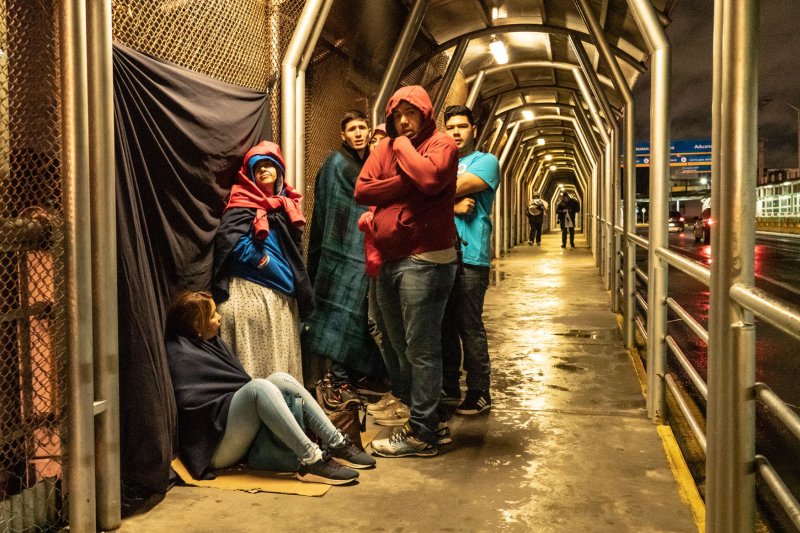A group asylum seekers from Venezuela wait to cross the U.S. border from Reynosa, Mexico, on January 26, 2019. Undocumented migrants entered the United States in February at the highest levels for the month since 2007. File Photo by Ken Cedeno/UPI |
License Photo
March 5 (UPI) -- More than 76,103 undocumented migrants crossed into the United States from Mexico last month, Customs and Border Protection said Tuesday, the highest monthly figure for February in 12 years.
The figure represents a 107 percent increase over the number of migrants who either presented themselves to authorities at legal ports of entry or were detained by Border Patrol agents over the same time period in 2018.
In addition to being the highest February figure since 2007, it's the highest monthly figure since Donald Trump was elected president.
Of the undocumented migrants who crossed in February, more than 60 percent were unaccompanied minors or members of a family unit, a more than 300 percent increase over February 2018. The majority are from Guatemala, Honduras and El Salvador.
"The vast increases in families and children coming across our border, in larger groups and in more remote areas, presents a unique challenge to our operations and facilities, and those of our partners, including the [non-governmental organizations] who work to assist these individuals and families throughout their immigration proceedings," CBP Commissioner Kevin McAleenan said.
"This is why I am working with our government partners and have identified additional funding for humanitarian resources in the field, including expanded medical protocols, and the addition of a more appropriate central processing center to handle the increased volumes of family units and unaccompanied minors."
Sarah Pierce, a policy analyst with Migration Policy Institute, said she believes the rising number of undocumented family units and minors at the border are likely because of the Trump administration's crackdown on immigration.
"The threat of harsh policies increases arrivals," she said on Twitter. "For example, the end of family separation ushered in four straight months of the highest family apprehensions on record. Chaos breeding chaos."
Despite the increases during Trump's first two years in office, undocumented immigration numbers are still down from figures in previous decades. Border apprehensions reached a peak of 1.6 million in 2000 and have been on a decline, reaching a low of 327,577 since then.
"We're down to a quarter from peak," Everard Meade, director of the Trans-Border Institute, told UPI in October. "There has been a steep downward trend for the last 15 years or more. It's transcended a conservative eight-year administration and a Democratic administration for eight years. It is bigger than politics. This is not about [President Donald] Trump."
CBP figures released Tuesday also showed there have been apprehensions of 70 groups of 100 or more individuals so far in fiscal year 2019, up from a 13 such groups in all of fiscal year 2018.
Last month, Trump declared a national emergency regarding border security so he can divert billions of federal dollars to wall construction without congressional approval. He has blamed undocumented immigrants for bringing crime to the United States.
"We're going to confront the national security crisis on our southern border," Trump said in a Rose Garden speech Feb. 15. "We're talking about an invasion of our country with drugs, human traffickers, with all kinds of criminals and gangs. We need new wall."
The House voted to block the emergency declaration last week, and though Senate Republican leader Mitch McConnell said the resolution would likely pass in the upper chamber, he expects Trump to veto it.
Sixteen states and multiple immigration advocacy groups sued the Trump administration over the emergency declaration, accusing the president of unlawfully manufacturing a crisis at the border.















